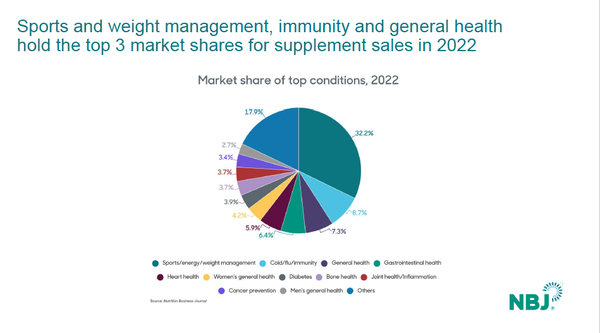
Think brain-health supplements are only for seniors concerned
about cognitive decline?
Yes, that’s one of the reasons brain health was the top growing supplement category in 2022, up 7.2% from 2021, but younger consumers -- “Gen Z or even Gen
X” -- are also fueling the market due to their interest “in focus and mental acuity,” according to Erika Craft, industry analyst for publisher/researcher Nutrition Business
Journal (NBJ).
Craft made her remarks during a recent webinar covering highlights of NBJ’s annual “Condition Specific Report,” annual research that covers U.S.
market share and growth for supplements covering 22 conditions.
Supplement growth in total rose 1.9% in 2022, and Craft said that brain-health products should continue to top the industry
average through 2026, when it will be growing at about 8.8%. The leading ingredient in current brain health supplements is fish oil, at 23%, but Craft sees combination herbal formulas growing in the
years to come.
advertisement
advertisement
Brain health, though, didn’t even make the top 11 condition categories for 2022 supplement sales, which were led by sports/energy/weight management, with nearly a third of
market share (32.2%), followed by immunity at 8.7%, general health at 7.3% and gut health at 6.4%.
Sports/energy/weight management was also one of the top growing categories in 2022, in third
place with a 5.7% increase, while children’s health, with a 6.9% increase, placed second, and menopause symptom supplements fourth, with 4.8% growth.
“Menopause has made quite a
comeback,” Craft said (the category had declined 3.3% in 2020). “The largest market share is happening in combination herbal formulas – up 15.9% in 2022, which suggests innovation is
really driving the market.”
But Todd Runestad, content director of NBJ sister publication Natural Products Insider, noted that few brands are doing studies of such
combination formulas. “That’s an opportunity” for brands, he stated, “if they can say we’ve studied it and here are the results.”
Indeed, in a June
NBJ survey, 61% of consumers, asked in this case about dietary supplements, said they look for products that are clinically researched or science-based.
Dietary supplements fall under
that broad sports/energy/weight management category, which also includes pre-workout powders, a category that hardly existed a decade ago but “you can go into a Target now and buy pre-workout
formulas,” said Rick Polito. NBJ’s editor-in-chief.
Runestad and Polito also cited a need for more fiber in products like protein bars and powders.
Mentioning
New York Times articles that derided protein bars for their high sugar content -- “it’s really like eating a donut with a protein boost” -- Runestad said “the lesson for
product developers would be, ‘maybe you don’t have to use that much sugar. Maybe you can use a prebiotic that has a sweetener aspect and a fiber aspect too.” Adding fiber would also
be an “intelligent way to meet the market with a more helpful product,” he noted.
“When is fiber going to be marketed better?, asked Polito. “It’s not just for
poop. There’s weight management, cholesterol, mood. I’m still looking for a good protein powder that has enough fiber.”
There’s room to run in fiber,” agreed
Runested. “It requires one big brand to champion an ingredient and really get the marketing right, to hit that consumer-resonant tone.”
Even more than pre-workout powders, vision
health is a category “that’s really risen from out of nowhere,” said Runested. One of the reasons: research from companies like Kemin Foods (ForaGlo Lutein) add OmniActive (Lutemax
2020) has shown that their ingredients “really helped” fight age-related macular degeneration.
That condition, Runested explained, used to be the leading cause of blindness in
those over 65, but the age has now been lowered to 60 and continues to decline because blue light from screens is one of the disease’s leading contributors.
Research has also shown that
the macular supplements help with eye strain and eye fatigue, “which is something that you would experience if you are an esports athlete,” Runested said.
Those esports athletes,
formerly called gamers, are also heavily into brain health supplements for “focus and concentration,” he noted.